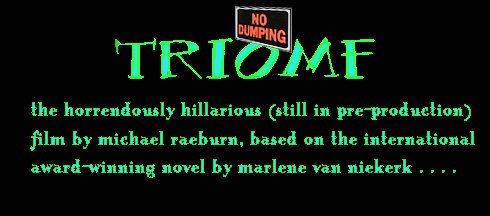I've been considering Triomf's "dysfunctional" characters. You know, dysfunctional; as in incestuous, mentally ill and just plain nasty. It made me want to know more about Marlene van Niekerk, and whether she was a nutcase too. I mean, where did she get all of those details? Did she live with these people? Or is it from her very own lively imagination?
Here's a little backgrounder taken from Niekerk's bio on the Stellenboschwriters website:
 Born on the farm Tygerhoek near Caledon in 1954
Born on the farm Tygerhoek near Caledon in 1954- Studied Languages and Philosophy at Stellenbosch University
- Obtained a MA with the thesis: Die aard en belang van die literêre vormgewing in 'Also sprach Zarathustra' in 1978. (Not sure what that translates to but there's something in there about "Thus spake Zarathustra.")
- At university she wrote three plays for the lay theatre.
- Moved to Germany in 1979 to apprentice for directing at theatres in Stuttgart and Mainz
- Continued philosophy studies in Holland
- Obtained a Drs with a thesis on the works of Claude Lévi-Strauss and Paul Ricoeur: "Taal en mythe: een structuralistische en een hermeneutische benadering."
- Lectured in Philosophy at University of Zululand, and later at Unisa.
- Lectured in Afrikaans and Dutch at University of Witwatersrand.
- Currently Professor at the Department of Afrikaans and Dutch, Stellenbosch University.
Heyns: It is not only The Reluctant Passenger that was funny. Your readers marvel at the specific type of dry ironic wit that you wield in your novels, also in The Typewriter's Tale. Could you say something about the place and use of humour in your work?
Niekerk: Humour happens. I didn't think, when I started writing The Typewriter's Tale, that there was anything particularly funny in the material, but somehow it turned out that way. Of course, few situations are inherently funny: the poor bugger who slips on the banana skin and breaks his coccyx fails to see why the rest of the world is laughing. It's a matter of the perspective one adopts, and again I can only say that it happens: I see these people and they're funny. It's possible that reading authors like Jane Austen and Henry James schooled me in a certain oblique way of looking at things, so that the more seriously people take themselves, the funnier they are. In any case, in the South Africa I grew up in, in which some people took themselves very seriously indeed ("Dit is ons erns"), humour was a mode of survival.












No comments:
Post a Comment